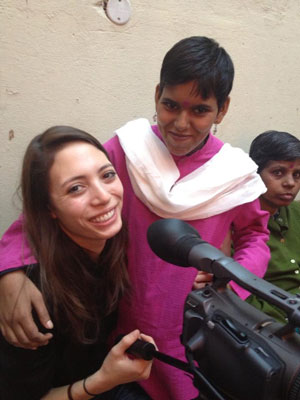Student filmmakers
Documentary tackles mental health issues in India
April 8, 2013
By Mike Killeen

CSB senior Ashley Tong (left) and Kabita, a patient at a mental health facility in Kolkata, India, pose for a photo during a break in the filming of "Khulla."
If Ratnaboli Ray is correct, the latest Extending the Link (ETL) documentary produced by students at the College of Saint Benedict and Saint John's University is going to be "awesome."
"Khulla" made its Central Minnesota debut Tuesday, April 16, at the Gorecki Center, CSB.
Ray is a mental health activist and founder of Anjali, an organization in India that helps those suffering from mental illness. Her organization, an advocate for mental health patients which provides direct care services and helps reintegrate people into their homes, was featured in the documentary. Ray received a trailer of the documentary to preview.
"It came back with absolutely rave reviews," said CSB senior Lindsey Gideon, one of the co-directors of the documentary. "Ratnaboli said it was awesome, and that she was very much looking forward to seeing (the finished documentary), and she was forwarding it on to many of her friends and professional colleagues."
It is the sixth documentary produced by ETL, a non-profit, student-run venture through the CSB and SJU Donald McNeely Center for Entrepreneurship, with funding from various campus sources including the CSB and SJU Student Senates, private donors and outside groups.
Six students - Gideon, co-director Rebecca Lais, Rachel Mullin and Ashley Tong from CSB, and Sean Raible and Adam Brenteson from SJU - spent 16 days in Kolkata (Calcutta), India, shooting 23 hours of footage in late December and early January.
Lais had met with members of Anjali while studying abroad in India in spring 2012, and brought the idea of focusing on mental health issues in India back to ETL, one of approximately 20 options the ETL group considered.
"Khulla" comes from a woman who is interviewed in the documentary.
"It means open and change. The patient said, 'My heart opens here.' It's a really cool phrase that we've tried to highlight in the film," Gideon said.
The students found that over 50 million Indians deal with some sort of mental illness. Conditions in the mental health hospitals are "difficult to see," Gideon said, including patients being neglected and sexually abused.
But groups like Anjali and Antaragram, another mental health organization which runs a facility just outside Kolkata, are changing that picture in India, Gideon said.
"We found that they're doing some amazing work and making huge leaps and bounds in improving these conditions," Gideon said.
ETL seeks to foster discussion on global issues by increasing awareness. Its goal is to inspire action.
"We want students to think about their actions toward people with mental health issues, or just the issue itself," Gideon said. "We want people to talk about it. We want (mental health issues) to be more out in the open, and we want it to become less stigmatized.
"I think there are wonderful opportunities on campus. WACOSA (a local organization which helps 500 individuals with disabilities receive training and support that leads to employment) brings in people with mental disabilities to work on campus, so I think students could interact with them more," Gideon said. "One of the things in India that we would hope to do is to create a stronger relationship with Anjali and the India study abroad program. The study abroad program currently has a service learning aspect, and we think that Anjali could become a strong partner with that."
SJU junior Jack Somers is providing a musical score for the finished documentary, although it won't be ready for the local premiere. It will eventually be added to DVD copies that will be available to schools, churches, groups and civic organizations from ETL.
